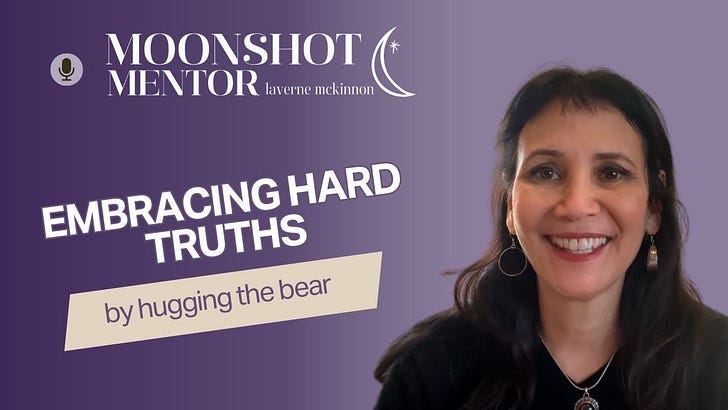“I keep telling myself, ‘You wanted this,’ but it doesn’t change how bad I feel. I don’t get it—how can I feel this sad about something I wanted? It doesn’t make sense.”
Grief frequently doesn’t make sense. It doesn’t make sense to the person feeling it, and it doesn’t make sense to the people witnessing it. Especially when choice is involved.
I’ve seen this happen with friends who chose to divorce, to move, or even one friend who cut her long hair super short. “I wanted this. So why do I feel like someone died?”
Grief is a direct result of the depth of attachment to someone, something, somewhere. And not everyone shares the same depth of attachment. So it might be difficult to empathize.
It’s also difficult to understand for oneself, because it doesn’t follow the “rules” of choice. This happens all the time in people’s professional lives. Leaving a job whether it’s through retirement, a planned exit, or a buyout can be an exciting and intentional step toward something new. But even if you made the decision, you may still be grieving. And that grief deserves a place at the table.
What You’re Feeling Has A Name
It’s called disenfranchised grief—the kind of grief that’s real but often dismissed because it doesn’t fit into neat cultural boxes.
Grief after someone dies? People get it. Grief after getting fired? There’s empathy. But grief after retirement or stepping away on your own terms? That rarely gets any validation.
When you and the world see your choice as a “win,” it’s easy to question your sadness. After all, there’s relief, logic, and the promise of a next chapter. But there may also be a loss that hasn’t been witnessed.
When you leave a role you’ve poured yourself into, especially a leadership position or a long tenure, it can fracture your sense of identity, belonging, and purpose.
Case Study
One client I worked with retired early, after a decade of high-impact work in the nonprofit sector. “I thought I’d feel proud,” she said. “Instead, I’m… embarrassed. Like I’m weak for missing it.”
We unpacked that feeling together. She didn’t regret leaving. But she missed being needed. Bringing surprise bagels to her team. The stupid cast iron radiator in her old office that would crank the temp up to 88 degrees. The annual brainstorming session with the board at the fancy country club. The summer interns. The adrenalin of setting a big development number. The routine of getting into her car, listening to a podcast, and the joy of finding a decent parking spot.
We designed a ritual for her to acknowledge what had changed. She made a list of everything she missed—and was surprised by how long it was. Then she asked her partner to go with her to visit many of those places, so she could say a proper goodbye. She even took a photo of the radiator!
She’d had the going-away party with all her colleagues. That felt complete. But she hadn’t realized how much more there was to say goodbye to. And that mourning it didn’t mean she made the wrong choice—it meant she had loved it.
Maybe This Is You, Too
Maybe you're the one who said yes to the package. Who submitted your resignation. Who walked away on your own terms. And maybe you're wondering why it’s still hard to get out of bed some mornings.
Accept that it’s a sign of the depth of your attachment. Of the deep investment you made in a chapter that was truly important to you.
Bottom Line
Grief doesn’t require tragedy. It simply means something mattered.
You can choose to leave a job and still mourn what you lost. You can feel grateful and devastated in the same breath. You can miss who you were even while becoming someone new.
Before You Go (and Journal Prompts Below) …
I’ve long admired Goli Kolkhoran’s work—her podcast Lessons from a Quitter is a space where real conversations happen about what it means to let go of the things that no longer serve us. As a lawyer turned entrepreneur, Goli walks the talk. She’s also someone who makes space for women to evolve, change direction, and rewrite the script.
I recently joined her for an episode where we talked about how grief shows up when your identity is tied to a job, what happens when a role or dream ends, and how loss isn’t always about death. Sometimes it’s about who you thought you’d be. We also talked about the difference between head-grievers and heart-grievers (you’ll know which one you are!), and why mourning is a crucial part of career transformation.
Whether you’ve been laid off, burned out, chosen to leave, or are simply feeling disoriented in your work life, I hope this episode helps you feel a little more seen.
Journal Prompts for Paid Moonshot Mentor Subscribers:
Grieving a choice you made can stir up confusion, doubt, even guilt. These journal prompts are designed to help you gently untangle those feelings—to name what’s been lost, what still lingers, and what kind of goodbye you might need.
Exclusively for paid Moonshot Mentor subscribers, here are three prompts to deepen your reflection:
Listen to this episode with a 7-day free trial
Subscribe to Moonshot Mentor with Laverne McKinnon to listen to this post and get 7 days of free access to the full post archives.












